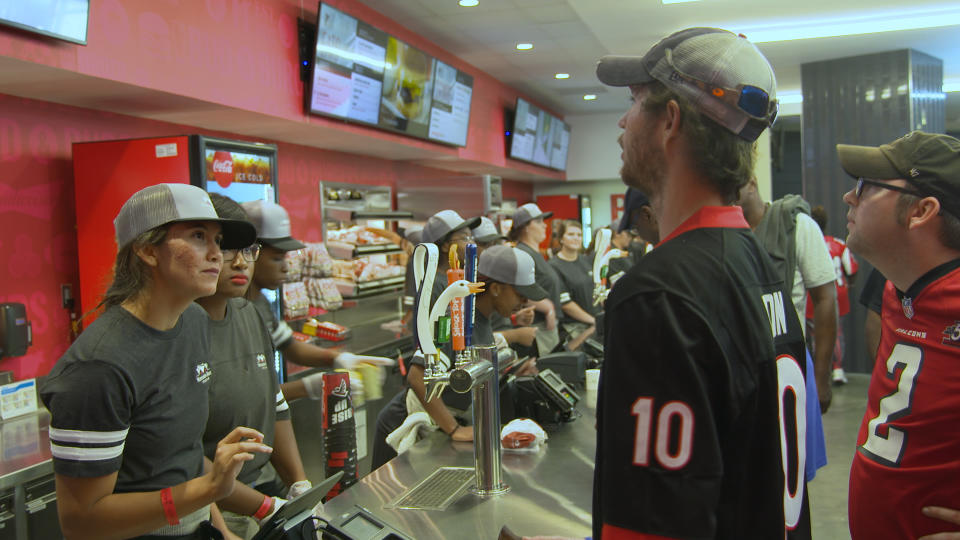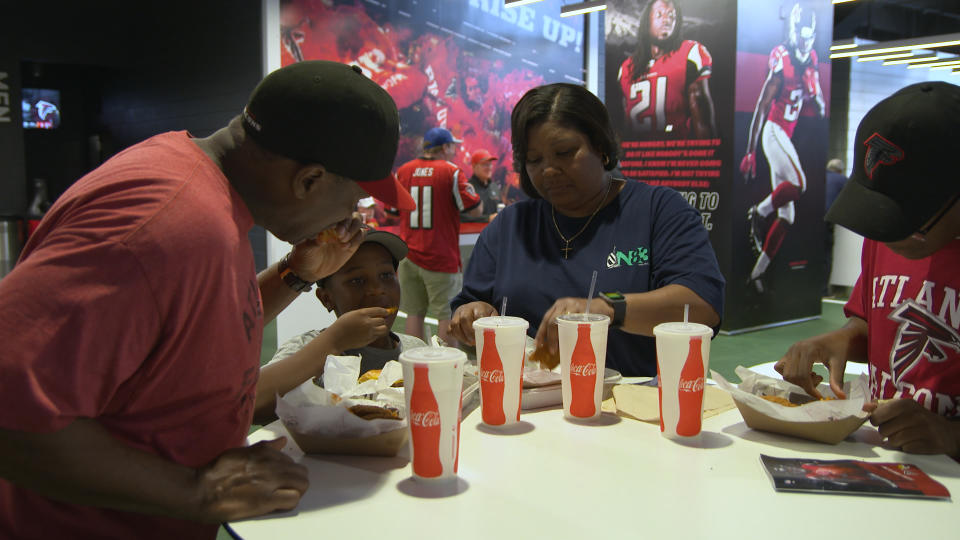$2 HOT DOGS: The story behind Atlanta Falcons' low food prices
At a typical sports arena in America, a $10 bill might get you one beer. At Mercedes-Benz Stadium, the new $1.6 billion home of the Atlanta Falcons and Atlanta United MLS team, it can buy you two beers. Or five hot dogs. Or three hot dogs and an order of fries, plus $1 back.
The food prices are low—crazy low. Minor League Baseball low. They are the lowest food prices in US major league sports.
The stadium offers $2 hot dogs, $2 sodas (with unlimited free refills), $3 french fries, $3 popcorn, and $5 12-ounce light beers. The concessions are also in “whole dollar” prices, meaning no coins to worry about (those prices already include tax).
When football fans learned of the food prices back in May, they went nuts, and the news went viral. But fans may be surprised to learn that this NFL team’s food price idea came from… golf.
“Part of the inspiration came from The Masters,” says Mike Gomes, VP of fan experience for the stadium. “It’s one of the most exclusive places to go, and people who go don’t talk about the azaleas or the 16th hole, they talk about how low the food and beverage pricing is.” (The Masters, in Augusta, Ga., is known for its $1.50 pimento cheese sandwiches and $4 beers served in plastic souvenir cups.)
Yahoo Finance visited the stadium before the team’s final preseason game to get the full story on the surprising strategy.

How can the Falcons afford it?
Gomes says the “fan-friendly pricing” idea was in the works for years, even before the groundbreaking ceremony on the property back in 2014. Falcons owner Arthur Blank and CEO Rich McKay wanted to do something radical with food pricing because, as Gomes puts it, “Ballparks, arenas, movie theaters all overcharge us, and we all became used to it… that you get gouged. And we wanted to say, ‘It doesn’t have to be what you’ve always been used to.'”
The stadium has 673 “points of sale,” including food stands as well as alcohol-only stands, and 100% of the stands have the an-first pricing, meaning the $2 hot dogs, $3 vegan hot dogs, $2 bags of popcorn, $5 cheeseburger, and so on. (Not every stand offers every item.) Of course, there are also $9 craft beers, $8 double cheeseburgers, and other higher-end items. But the idea was to not offer the low-price items at a limited number of stands.
In other words, it isn’t a short-term PR stunt. Gomes says people keep asking him, “Is this a 1-year thing, is this a gimmick to get people in the building? It’s not. This is a forever pricing model.” It isn’t just a Falcons model either: it’s the locked-in pricing model for all events at the stadium, which will include MLS games, and concerts—and Super Bowl 53 in 2019.
So, how can the Falcons afford to set the food prices so low?
PSLs, or personal seat licenses, help offset the cost. As is the model at most new NFL arenas these days (dating back to when the Carolina Panthers used them to raise money for the team’s new $250 million stadium in 1996), season tickets at the Falcons’ new home require purchasing a PSL, or personal seat license, which guarantees you first dibs on a certain seat for any event at the stadium. Think of it as a membership fee you pay each year, on top of the price of your actual tickets. (Or think of it like paying for an annual gym membership, and also paying a fee for every class you take there.) It is akin to leasing your seat from the stadium. And the revenues from PSLs go to the stadium, whereas revenue from game tickets is shared with the league.
The PSLs at Mercedes-Benz Stadium aren’t nearly as pricey as they are at other new NFL venues in larger markets, but they aren’t cheap: the entry-level starts at $2,500 per year, per seat, and the highest level is $45,000 per seat. PSLs have generated more than $250 million in revenue for the team.
At a typical Falcons home game this season at their new $1.6 billion arena, the team says an estimated 70% of the fans in seats will be season ticket-holders.

Yes, the Falcons will make a lot less money on their concessions at first, but make no mistake: the team will still cut a profit.
“Are we making less money than we otherwise would have, is Arthur making less money? Yes, he is,” says Gomes. “But he believes in the long-term relationships we’re establishing with our fans.”
Ripple effects of low food pricing

Gomes says that the team knew fans would be excited about these prices, but still didn’t quite anticipate the level of national interest. He also says the team wasn’t necessarily trying to create a broader shake-up.
“We’re not trying to change the industry—if that happens, great,” he says. “We’re trying to do something for the fans that come to this building.”
But a shake-up is what the Falcons may have started.
The food pricing at this stadium has ripple effects to come, small and large: on fan behavior at the stadium; on other teams’ new arenas in the future; and on the sports concession industry.
Start with Falcons fans. With prices this low, might they tailgate for a shorter time, and come into the stadium earlier, and might they end up drinking more beer per person? Those are questions the team has had to consider and anticipate.
Getting fans into the stadium earlier than usual may be a good thing for safety purposes: fewer bottlenecks in the minutes just before kickoff, when fans usually come in after tailgating for as long as they can.
“We do have the opportunity to have fans who, instead of finding a local sub shop to go get a sandwich because the food’s too expensive, come here,” Gomes says.
As for the $5 domestic draft beers, he says, “The goal isn’t to encourage people to drink more. We were conscious to not all of a sudden go to nickel beer night.”
And the concession business model at the stadium is somewhat radical for traditional sports arenas. In the typical model, a concessionaire pays the team or stadium an upfront fee, and takes on all the capital risk and staffing responsibility, which leads to high food prices, because the concessionaire needs to recoup its investment. At Mercedes-Benz Stadium, the Falcons and owner Arthur Blank are taking on those risks, and paying a concessionaire, Levy Restaurants, only to help manage operations, not supply the food, equipment, or staff.
That means the Falcons are paying the concessionaire a lower fee, and can pass those savings on to fans.
“The concession business model we have here is different than anywhere else in sports,” Gomes says.
All of this is exciting for Falcons fans, and it brings the team a lot of positive buzz, but it could be risky. The $5 beers could lead to overly inebriated fans; the experiment and all of the attention could annoy other NFL owners, who may feel pressure to follow suit at their new arenas; the quality of the food could collapse over the course of the season.
But for now, the prices are earning the team good vibes with its fans, after it blew a 25-point lead in Super Bowl 51 last February. Multiple fans at the stadium on Aug. 31 told Yahoo Finance they showed up for the game much earlier than they normally would, lured by the low food prices.
“We’d be lying to you if we said we’ve got it totally under control,” Gomes says. “The first several events will be bumpy, in terms of not only our execution but non-typical fan behavior patterns. We’ll learn a lot.”
—
Daniel Roberts is the sports business writer at Yahoo Finance. Follow him on Twitter at @readDanwrite.
Sportsbook is our ongoing sports business video and podcast series.
Read more:
Atlanta NAACP will protest NFL at Falcons home opener
Barstool Sports CEO: Many media outlets ‘forgot they were consumer brands’
Inside ESPN’s plan to reinvent SportsCenter
George Foreman III is taking his boxing gym national
MLB commissioner: ‘We are reexamining our stance on gambling’

